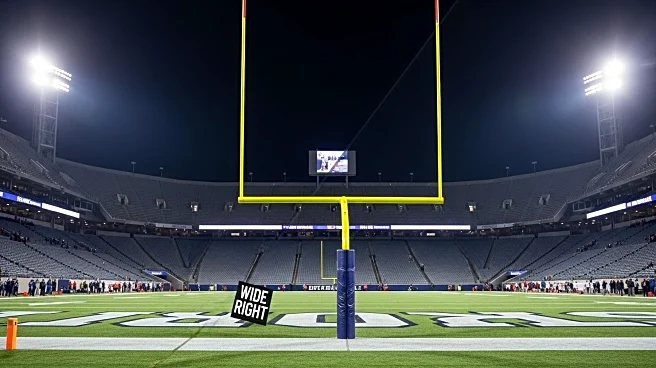What's Happening?
The Miami-Florida State football rivalry is marked by the infamous 'Wide Right' games, which have become a significant part of college football history. The term 'Wide Right' originated from a series of missed field goals by Florida State in crucial moments against Miami, starting with the first occurrence on November 16, 1991. In that game, Florida State, ranked number one, faced Miami, ranked number two, with national championship implications. Florida State's kicker Gerry Thomas missed a 34-yard field goal, resulting in a Miami victory. This pattern repeated in subsequent years, notably in 1992 and 2000, with Florida State missing critical field goals that led to Miami victories. The rivalry has seen Miami leading the all-time series 36-33, including a 13-9 record since joining the ACC.
Why It's Important?
The 'Wide Right' games have had a lasting impact on the Miami-Florida State rivalry, influencing the dynamics of college football in the U.S. These games have not only affected the standings and championship aspirations of both teams but have also contributed to the cultural lore surrounding college football. The repeated instances of missed field goals in high-stakes games have added a psychological dimension to the rivalry, affecting players and fans alike. The rivalry is a testament to the unpredictability and drama inherent in college sports, showcasing how single moments can define the legacy of teams and players. The games have also highlighted the importance of special teams in football, where a single kick can determine the outcome of a season.
What's Next?
As the rivalry continues, both teams are expected to face off in future matchups with renewed intensity. The historical context of 'Wide Right' will likely play a role in the preparation and mindset of players and coaches. Florida State will aim to overcome the psychological barrier posed by past missed opportunities, while Miami will seek to maintain its competitive edge. The rivalry remains a focal point in the ACC, with implications for rankings and bowl game selections. Fans and analysts will watch closely to see if the 'Wide Right' narrative continues to influence the outcomes of future games.
Beyond the Headlines
The 'Wide Right' saga underscores the broader cultural and emotional aspects of sports rivalries. It highlights how specific events can transcend the game itself, becoming part of the collective memory and identity of teams and their supporters. The rivalry between Miami and Florida State is not just about wins and losses but also about the shared history and moments that define the spirit of college football. The psychological impact on players, the strategic adjustments by coaches, and the passionate engagement of fans all contribute to the enduring significance of this rivalry.











